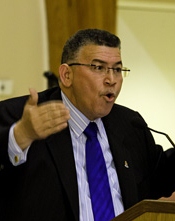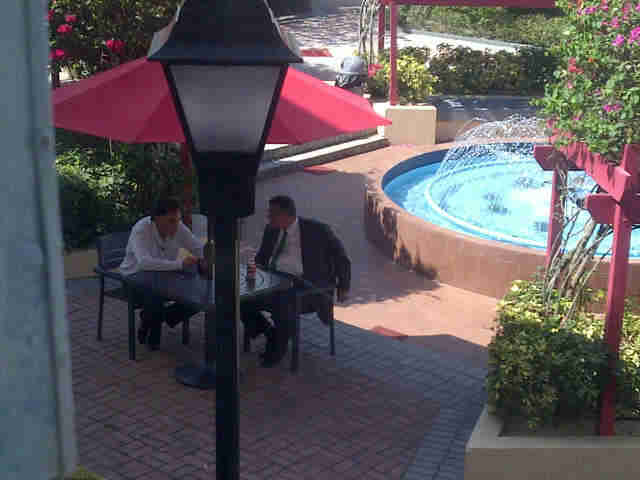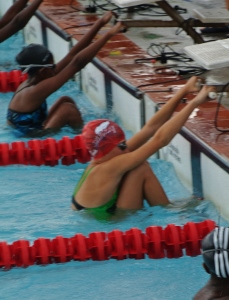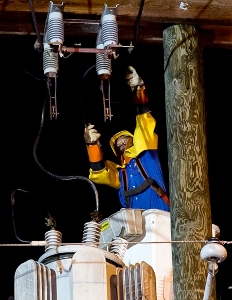Archive for March 19th, 2013

Mac’s case in hands of DPP
 (CNS): The former premier of the Cayman Islands has been placed on overnight bail after another full day of questioning by officers from the RCIPS Financial Crimes Unit on Tuesday. He has been bailed to return to the police headquarters tomorrow. Although McKeeva Bush has not yet been charged, police officials said that evidence gathered in the investigation so far and the information from the interviews has been submitted to the Director of Public Prosecutions for her to consider and offer her advice to the police on whether or not the former and first premier of the Cayman Islands should be charged in connection with his arrest on suspicion of theft and corruption allegations.
(CNS): The former premier of the Cayman Islands has been placed on overnight bail after another full day of questioning by officers from the RCIPS Financial Crimes Unit on Tuesday. He has been bailed to return to the police headquarters tomorrow. Although McKeeva Bush has not yet been charged, police officials said that evidence gathered in the investigation so far and the information from the interviews has been submitted to the Director of Public Prosecutions for her to consider and offer her advice to the police on whether or not the former and first premier of the Cayman Islands should be charged in connection with his arrest on suspicion of theft and corruption allegations.
Meanwhile, Suresh Prasad the director of Midland Acres who was arrested in relation to the importation of explosives investigation has been re-bailed until early April.
Both Bush and Prasad complied with the conditions of their bail and presented themselves to the police on Tuesday morning, police said. The police conducted further interviews with Bush and collated additional relevant evidence.
 “In line with normal procedures, the details from those interviews have been forwarded to the Director of Public Prosecutions. This is to allow her to consider the latest information along with the previously submitted evidence file,” a spokesperson for the RCIPS stated, adding that Bush has been placed on overnight bail and is due to present himself to RCIPS officers again on Wednesday afternoon. “The re-bailing is to allow the DPP an opportunity to consider all of the evidence currently available and thereafter advise the RCIPS of her decision as to whether charges can be laid,” she added.
“In line with normal procedures, the details from those interviews have been forwarded to the Director of Public Prosecutions. This is to allow her to consider the latest information along with the previously submitted evidence file,” a spokesperson for the RCIPS stated, adding that Bush has been placed on overnight bail and is due to present himself to RCIPS officers again on Wednesday afternoon. “The re-bailing is to allow the DPP an opportunity to consider all of the evidence currently available and thereafter advise the RCIPS of her decision as to whether charges can be laid,” she added.
(Photo: Bush consults with his lawyer outside the Police HQ Tuesday)
Bush was arrested at his home in December on suspicion of theft and corruption offences. The allegations include the misuse of a government credit card as well his alleged involvement in an importation of commercial dynamite without the correct permits. The police are also understood to be carrying out several other investigations relating to other accusations of corruption, including a land zoning deal and allegations of bribery among others that the police had not yet defined.

Final countdown to CARIFTA for local swimmers
 (CIASA): Final preparations are in full swing for CARIFTA 2013 which starts in less than two weeks, on March 29th. Eighteen swimmers will be representing Cayman this year– with five athletes: Alex Dakers, Eddie Weber, Ella Plunkett, Kyle Fraser and Sarah Jackson making their CARIFTA debut; and two athletes: Geoffrey Butler and Kyle Fraser, making their final CARIFTA appearance. And for those reading carefully yes, Kyle will be competing at CARIFTA for both the first and last times this year. The CARIFTA Management and Coaching team, led by CIASA’s Technical Director Coach Ian Armiger is made up on Coach Katie Lambert and Coach Andy Copley and Team Managers Sandy Hew and Jeffrey Wight.
(CIASA): Final preparations are in full swing for CARIFTA 2013 which starts in less than two weeks, on March 29th. Eighteen swimmers will be representing Cayman this year– with five athletes: Alex Dakers, Eddie Weber, Ella Plunkett, Kyle Fraser and Sarah Jackson making their CARIFTA debut; and two athletes: Geoffrey Butler and Kyle Fraser, making their final CARIFTA appearance. And for those reading carefully yes, Kyle will be competing at CARIFTA for both the first and last times this year. The CARIFTA Management and Coaching team, led by CIASA’s Technical Director Coach Ian Armiger is made up on Coach Katie Lambert and Coach Andy Copley and Team Managers Sandy Hew and Jeffrey Wight.
Two weeks ago the team received a presentation from Mr. James Myles, the Lead Doping Control Officer for the Cayman Islands in the Medical and Anti-doping Commission of the Cayman Islands Olympic Committee. With experience testing locally or in the Region, Mr. Myles uses his experience to present to local athletes as well so that they know what to expect when they are competing … he talked the athletes through the process, showed them a kit and stressed how important it is that if they are selected for random dope testing that they comply, but that they do so with a Team Manager with them and that they check the testing equipment to ensure that it is new and has not been tampered with.
Mr. Myles said this: “We at the Medical and Anti-Doping Commission of the Cayman Islands Olympic Committee are committed to keeping Cayman Islands National athletes dope free, we are dedicated to ensuring that all athletes, especially Caymanian athletes PLAY TRUE in all sports at all time. We feel that the earlier our aspiring elite athletes are exposed to the process the more comfortable their sporting careers will be and the doping control process will provide for them the confidence that they are competing on a level playing field and that their place in the world is TRUE.”
The athletes have also had a team building session where they got to know each other better – outside of the usual environment of swim training or school – and have had one of two CARIFTA Squad Training Sessions as well.
“These athletes all know each other and compete against each other routinely. The CARIFTA Squad Training sessions gives the athletes and coaches a chance to work together, and to focus on skills and techniques such as relay exchanges where timing is critical. Fast, efficient and accurate relay exchanges can win the race. Swimmers training together; getting better and better at judging exactly when the swimmer in the water will touch the wall is something which practice and familiarity makes better,” said Coach Ian Armiger, Cayman Swimming’s Technical Director.
“This is my first CARIFTA,” he continued. “I am looking forward to it, to really seeing what FastSwimming in the Caribbean Region at this level looks like so that we can work more strategically with our competitive swimmers in the future. We could not do this without our sponsors the Cayman Islands Government, Maples, Subway, Cayman Airways and CIASA and we are committed to representing the Cayman Islands with pride and honour while we are in Jamaica,” he finished.
The CARIFTA Swimming Squad trained at the Lions Aquatic Center last weekend and will be training at the Camana Bay Aquatic Center next weekend. They leave for Jamaica on Tuesday March 26th, will be training in the National Stadium Pool and continuing Team Building activities in the days leading up to the start of the competition on the 30th.

Premier unveils energy policy at eleventh hour
 (CNS): Just nine weeks ahead of the general election, the premier has become the latest Cabinet minister to launch an eleventh hour policy document. Following the launch of last minute education and health polices, after four years in office Juliana O’Connor Connolly has finally unveiled a National Energy Policy (NEP), a document promised by her ministry at the beginning of the UDP administration. According to O’Connor-Connolly, the policy defines and directs the local energy sector and sets out goals, objectives and policies. The priority is to decrease energy costs, increase environmental sustainability and security, as well as develop the local energy industry.
(CNS): Just nine weeks ahead of the general election, the premier has become the latest Cabinet minister to launch an eleventh hour policy document. Following the launch of last minute education and health polices, after four years in office Juliana O’Connor Connolly has finally unveiled a National Energy Policy (NEP), a document promised by her ministry at the beginning of the UDP administration. According to O’Connor-Connolly, the policy defines and directs the local energy sector and sets out goals, objectives and policies. The priority is to decrease energy costs, increase environmental sustainability and security, as well as develop the local energy industry.
Presenting the policy in the Legislative Assembly last week, the premier revealed statistical targets, which include making 21 percent energy savings, 13.5 percent of electricity sold generated from renewable sources, and a 19 percent reduction in greenhouse gas emissions compared to a business as usual scenario. She said the vision for the NEP was to have an efficient, diversified energy sector, supported by informed public behaviour within the Cayman Islands, which provides secure, reliable, and affordable energy in an environmentally sustainable manner.
“Decreasing energy costs to the country as a whole should be pursued as the priority goal, given very high costs and prices of energy in the Cayman Islands,” the premier told her legislative colleagues. “The priority granted to decreasing energy costs to the country as a whole has three important implications.”
O’Connor-Connolly said government would pursue new energy technologies that help reduce costs as soon as they become viable and could benefit the country. “Prioritizing certain technologies that are viable today shall not mean discarding once and for all other technologies that are not yet viable," she stated.
She made it clear that cost would still outweigh environmental considerations and said that where a sustainable energy policy could increase energy security, environmental sustainability and economic development but increased energy costs to the country, government will only pursue it if local economic benefits exceeded the economic costs.
“That is, provided that the government is convinced that the policy may lead to net economic benefits for the country as a whole,” the premier added.
The policy also calls for local rather than global green considerations to be prioritized and government will prioritize the increase in local environmental sustainability over global environmental sustainability.
The objectives of the NEP shall be dynamic, she said, to allow for appropriate flexibility in policy making, prioritizing technologies that are feasible and commercially viable rather than stating which type of technology the country will pursue. The premier said the electricity sector in Cayman must develop according to principles of economic efficiency, high quality and reliability of service, safety and environmental protection.
“The government recognizes that renewable sources of energy may represent an economically viable way for the Cayman Islands to reduce its dependency on imported fossil fuels, while preserving the environment of the country and contributing to reducing global emissions of greenhouse gases,” she stated, adding that government also recognizes that the generation and consumption of electricity, including that related to water and wastewater, represents a significant and unrealized potential to save energy, money, imported fuels, and local as well as global emissions.
The full policy document is posted below.